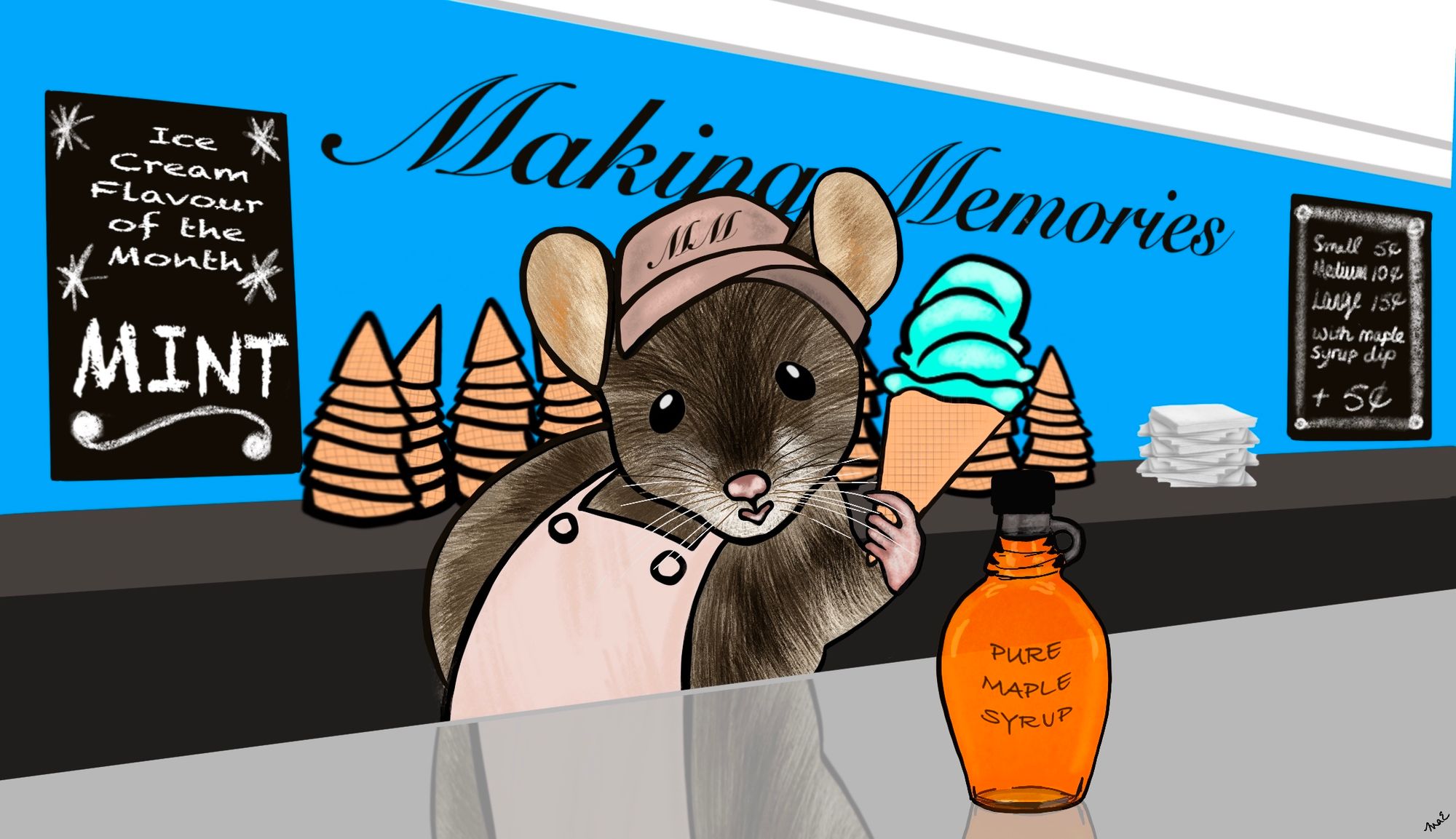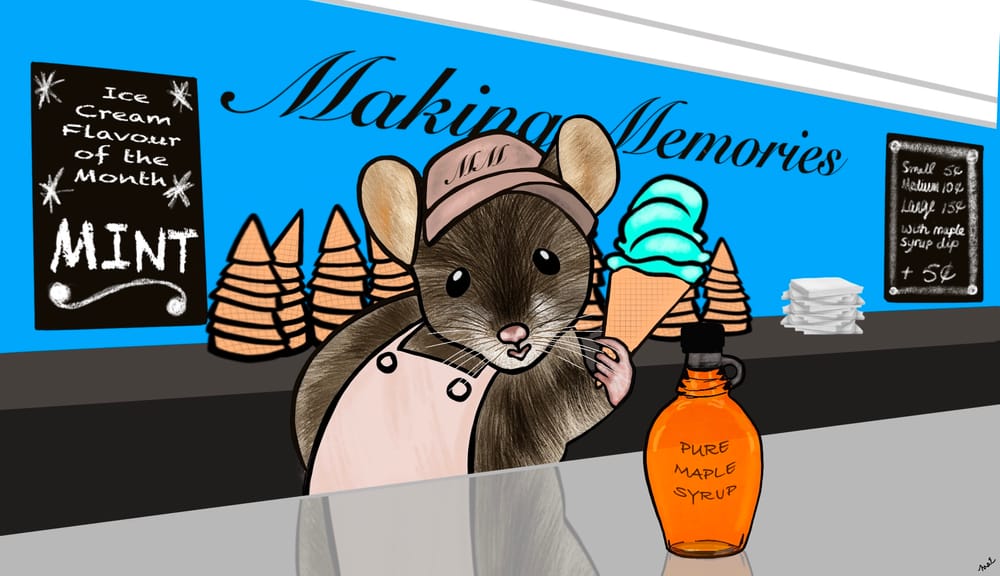Mint and Maple: Nature’s Memory Medicine
by: Paul Hetzler
Eating ice cream on a regular basis helps combat Alzheimer’s and other forms of dementia, according to recent studies. At least that’s how I interpret the results. In any case, there’s good news about treating cognitive decline, and it’s tasty.
In North America, nearly one in ten adults older than 65 has some form of dementia, while another 20 or so percent have mild cognitive impairment. With treatment costs rising and our over-65 cohort expanding faster than the population at large, dementia is a topic that won’t get old anytime soon.
Though Alzheimer’s disease was first described in 1906, it seems to have been mostly forgotten until the mid-1970s, when real research began at last. Historically, those with dementia were locked in asylums and subjected to brutal “cures” such as lobotomies and electric shocks, practices that continued through the 1950s. Later on, antipsychotics like haloperidol came into vogue for calming aggressive patients, until it was found such drugs made dementia worse.
Donepezil and other cholinesterase inhibitors, which tweak brain chemistry to aid memory, arrived on the scene in the late 1990s. And now there’s a drug called lecanemab, approved just this year, that slows or even prevents the formation of brain plaques and tangles thought to cause Alzheimer’s and certain other dementias.
But treatment goes beyond medication. Proven techniques for mild dementia include what’s known as cognitive stimulation therapy. In a group setting, patients discuss world events, collaborate on novel tasks, and play word and math games. For those with advanced brain disease, reminiscence therapy is a one-on-one talk about times past, using beloved objects or favorite songs to help spark memories.
We know smell and recall are closely linked. But until a few years ago, aromatherapy for dementia patients was relegated to non-medical use by family and friends of loved ones, since there was little science to support its value. Fortunately, that has all changed.

The reason smells can evoke deep emotions and rich memories is because other sensory inputs go through the thalamus, a “sorting hat” which routes data for processing elsewhere in our brains. But aromas zip from our olfactory bulb directly to our hippocampus, without passing “GO” or collecting $200. The hippocampus is involved in memory formation and has been shown to be more strongly connected to smell than to any other sense. Aroma is likely how Santa, who’s hundreds of years old, still keeps track of all those kids and presents. He’s got fragrant evergreen boughs, a tang of reindeer dung, and smoky chimneys to jog his memory.
In a report that came out in April 2023, researchers from the University of Navarra in Pamplona, Spain, detailed how a mere whiff of menthol, an essential oil extracted from mint leaves, improved cognitive function in mice. I’m not sure if we need or want our mice to be any smarter, but that’s what happened to every test animal. However, this is not even the most intriguing part of the study.
In addition to normal mice, the research team got their hands on a strain of transgenic mice that were modified to have the kind of brain plaques that cause Alzheimer’s disease in people.
These poor mice got dementia quite young, but apparently still figured out the reproduction thing, which was a plus for the team. To the researchers’ surprise, brief daily exposure to mint oil for six months was enough to completely halt cognitive decline in mice with Alzheimer's.
The cool thing about mint is that it’s easy to grow – in fact, the hard part might be keeping it in check. It prefers moist, rich soils but seems to thrive just about anywhere. Place a fresh mint sprig in water, and it’ll begin to root in a week or so. Once the roots are fairly well developed, transfer it to a corner of your property where it won’t be a nuisance if it spreads. Dried mint can be kept in glass jars for use in winter. A topically related study done at the University of California at Irvine this year took aromatherapy one step further. Published in July 2023, the report states that diffusing trace amounts of essential oils into the air during sleep improved brain function 226 percent in adults age 60-65. The odorants used in the six-month trial were not specified, but it’s a safe bet mint oil works as well, if not better, than other scents. I’ve already begun doing this at night – I’ll let you know when I feel 226% smarter.
And in 2016, scientists from the University of Toronto went public with findings, which they admitted were preliminary, that maple syrup helps prevent Alzheimer’s. Natural phenolic compounds in maple syrup apparently keep tangles and plaques from forming in the brain. It’s only right that this research took place in the maple capital of the world. Since that time, maple-syrup studies in the U.S. continue to affirm the results from the earlier work done at the University of Toronto.
Exercise, good sleep habits, a balanced diet, and plenty of social interaction will help protect brain function. It’s best to avoid smoking and limit alcohol as well. Given this new information on the benefits of eating syrup and sniffing menthol, I think we should all add mint ice cream topped with maple syrup to our diets, just to give our brains a leg up. There’s no sense taking chances.
This article first appeared in the Québec Farmers’ Advocate
By Paul Hetzler, Copyright 2023
Paul Hetzler is now writing about nature for The Saturday Evening Post and, of course, TI Life. He is a former Cornell Extension educator, and he also writes books! Be sure to check out the description of his books and I promise you will not only smile but you will want to give them as gifts for the next birthday - Just the titles makes you smile! Head of the Class: Smart as a Slime Mold, Shady Characters: Leprechaun Trees, Plant Vampires and Caterpillar Soup.
https://www.amazon.ca/dp/B09DN16VYC https://www.amazon.ca/dp/B08BR6NHDY amazon.com

